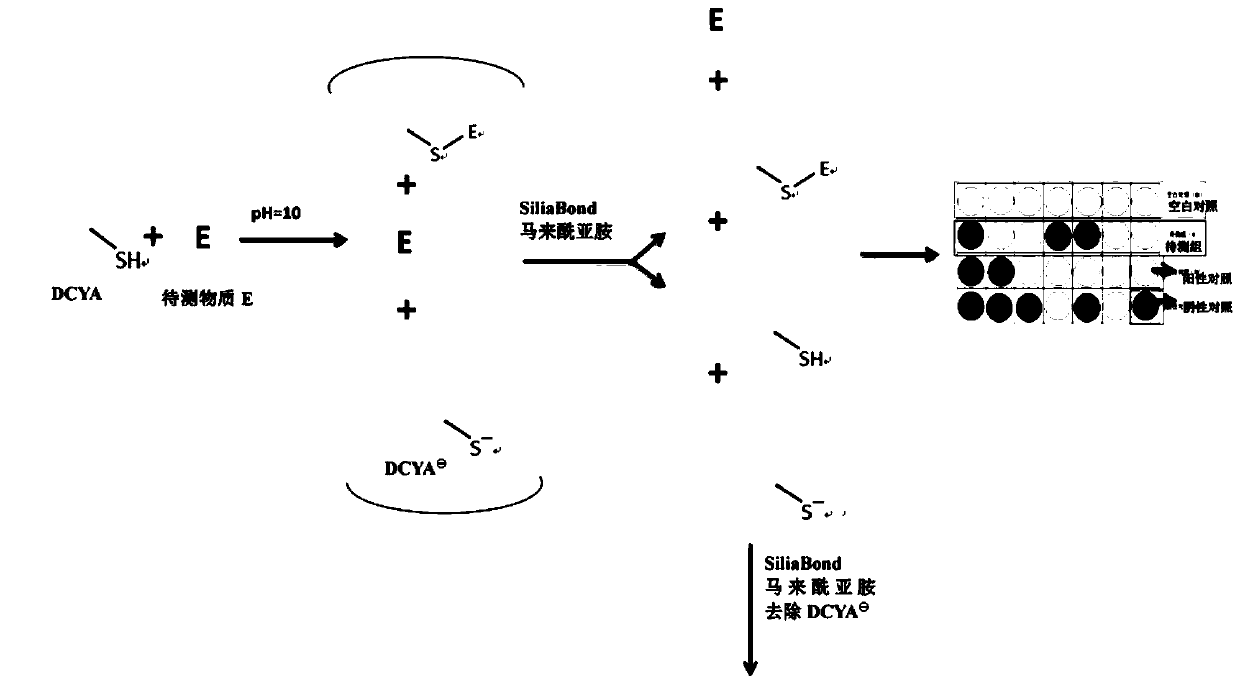Method for in-vitro high-flux screening of skin allergens based on fluorescent chemical reaction system
A chemical reaction, high-throughput technology, applied in measurement devices, scientific instruments, instruments, etc., can solve problems such as difficulty in predicting sensitization of mixtures, poor water solubility, and difficulty in predicting sensitization of pre-hapten
- Summary
- Abstract
- Description
- Claims
- Application Information
AI Technical Summary
Problems solved by technology
Method used
Image
Examples
Embodiment 1
[0055] Example 1 Skin Sensitivity Test of Rose Canis and Calendula Plant Extracts
[0056] (1), preparation of fluorescent chemical reaction system: preparation of 5-dimethylamino-N-2-mercaptoethylnaphthalene-1 sulfonamide, referred to as DCYA;
[0057] The specific process is as follows:
[0058] (1.1) Preparation of DCYA disulfide
[0059] In a 500 mL round bottom flask, dansyl chloride (4.0302 g, 14.94 mmol) was dissolved in 170 mL of acetone:water (30:1, volume ratio) solution. Cystamine dihydrochloride (1.6101 g, 7.15 mmol, 0.49 equiv) was added dropwise. 80mL0.1M NaHCO 3 Solution in aqueous solution was maintained at pH 7.5 by the addition of 0.5M aqueous sodium hydroxide solution. After reacting for 90 minutes, the mixture was diluted with 100 ml of chloroform, and the resulting solution was washed four times with aqueous sodium bicarbonate and then with water. Anhydrous MgSO for organic layer 4 Drying, concentration and purification by column chromatography (sili...
Embodiment 2
[0085] Example 2 Skin sensitization test of 10 kinds of fragrance ingredients
[0086] (1) The preparation of the fluorescent chemical reaction system is the same as in Example 1, which can be customized by Jill Biochemical (Shanghai) Co., Ltd., with a purity of >90%.
[0087] (2) Allergen screening test
[0088] (2.1) Establish test group, negative control, positive control and blank control. Each experimental group is the same as in Example 1.
[0089] The substances to be tested are shown in Table 4 below, and the specific preparation process is as follows: accurately weigh the sample, dissolve it in acetonitrile, and prepare a concentration of 5 mg / mL for use.
[0090] Table 4 is a list of 10 flavor ingredients
[0091]
[0092]
[0093] (2.2) After incubation for 20min±5min, use thin-layer chromatography for qualitative analysis, take 2μL of the substance to be tested and apply it to the TLC plate, add 0.8% methanol in chloroform solution to the chromatography cyl...
Embodiment 3
[0106] Example 3 Three brands of oil-in-water sunscreen skin sensitization test
[0107] (1) The preparation of the fluorescent chemical reaction system is the same as in Example 1, which can be customized by Jill Biochemical (Shanghai) Co., Ltd., with a purity of >90%.
[0108] (2) Allergen screening test
[0109] (2.1) Establish test group, negative control, positive control and blank control. Each experimental group is the same as in Example 1.
[0110] The specific preparation process of the substances to be tested is as follows: accurately weigh samples (brand A sunscreen, brand B sunscreen, brand C sunscreen), dissolve in acetonitrile, and prepare concentrations of 1mg / mL, 5mg / mL, and 25mg / mL.
[0111] (2.2) After incubation for 20min±5min, use thin-layer chromatography for qualitative analysis, take 2μL of the substance to be tested and apply it to the TLC plate, add 0.8% methanol in chloroform solution to the chromatography cylinder, develop, and check whether the TLC...
PUM
 Login to View More
Login to View More Abstract
Description
Claims
Application Information
 Login to View More
Login to View More - R&D
- Intellectual Property
- Life Sciences
- Materials
- Tech Scout
- Unparalleled Data Quality
- Higher Quality Content
- 60% Fewer Hallucinations
Browse by: Latest US Patents, China's latest patents, Technical Efficacy Thesaurus, Application Domain, Technology Topic, Popular Technical Reports.
© 2025 PatSnap. All rights reserved.Legal|Privacy policy|Modern Slavery Act Transparency Statement|Sitemap|About US| Contact US: help@patsnap.com



